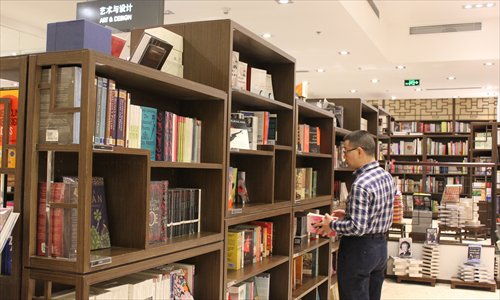Bookstores profit from new policy

A customer in a Page One bookstore in Beijing on Wednesday Photo: Xiong Yuqing/GT
The Ministry of Finance and the State Administration of Taxation jointly announced a preferential policy in an effort to promote culture by making books exempt from value added tax (VAT) from 2013 to 2017. The government will return the tax levied against book sellers in 2013 at the beginning of 2014.
Last summer saw a wave of small bookstore closures across China, and bookstore managers were forthright in their views of the new government policy.
Still harsh
"The new policy will certainly benefit us because the VAT and corporate income tax are the two main taxes for us. A 13 percent tax reduction means a lot," said Liu Gui, general manager of Page One China, which has opened three Page One bookstores in Beijing and one in Hangzhou, Zhejiang Province.
But Rui Shujun, a marketing manager of the bookstore chain zilihangjian, also known by their French name Belencre, told the Global Times that the policy will benefit the whole industry rather than helping private bookstores survive in what is becoming a tough business environment.
"The policy will also apply to online book sellers, book wholesalers and large bookstores, so it will not greatly improve the situation for small bookstores," said Rui.
Where previously only State-owned bookstores were eligible for government support, a report by the Beijing News stated the policy will now aid both private bookstores along with State-owned ones.
It will mean that some of the private bookstores will return to profit again after the taxes levied on them in 2013 are returned. But the harsh situation for private bookstores will remain unchanged.
Though the details of the new policy have not yet been revealed, bookstore owners will still need to survive great pressure from online book sellers. "The cost has also decreased for them and they might sell books even cheaper than before," added Rui.
Different cities also bring different problems for book stores. "In first tier cities such as Beijing we target customers who don't shop at State-owned bookstores, but in Nanjing and Wuxi (two cities in Jiangsu Province) some of our customers still buy books from Xinhua bookstores, which means we also face competition from traditional State-owned bookstores," remarked Rui.
Specialize and customize
Many privately run bookstores are having to adapt to survive in the tough market, or as Liu puts it "Make bookstores about more than merely selling books." Liu told the Global Times that 60 percent of his revenue comes from the sales of books, with most of them imported English books. "That is one of our features, especially for our target customers. Foreign books always bring higher profits as well as higher risks. We cannot return them [to the publisher] even if we are unable to sell them."
A further 20 percent of the revenue comes from the bookstore's café and restaurant and the final 20 percent from the sales of gifts and other products. Liu said it was important for bookstores to have such a varied revenue stream.
"Bookstores have to do much more than just sell books. We are creating a comfortable space for readers to spend their time, this is something online bookstores cannot offer." Liu went on to add that an awareness of the shopper's reading habits is also necessary. "We need to know more about our customers so we can specialize in the books they want and personalize our service."
Another way to stand out against the competition is to utilize the space of the bookstores according to Rui. "Different types of events are held in our stores, such as commercial activities where we rent out our space, reading clubs, plus book promotions and various services especially for our members." These events can help improve book sales quite considerably.
Rui is also introducing a new customer database that will help tailor book sales for individual shoppers. "We have more than 10,000 members in Beijing and our new system, which is supposed go online this year, is designed to give us more information about readers' interests and preferences. It will make the choice of books more personal," said Rui.
Calling for price control
The government is also granting 90 million yuan ($16.4 million) to support 56 private bookstores in a dozen cities, including Beijing, Hangzhou and Wuhan in Hubei Province. The funding will help the bookstores to purchase equipment and software and pay for the rent of their stores.
According to a report in the Hefei Evening News, the new policy will benefit many reputable bookstores and bring more variety to the book selling market.
Despite the tough environment some private bookstores are still opening new stores. Liu is opening a new bookstore in Chengdu, Sichuan Province and Rui is also planning more.
"We need more policies to support us, but the key one is to control the price of books, especially from online booksellers," Rui explained. "I appreciate policies on store rental and other support, but they are hard to put into practice. We choose sites in shopping malls and downtown areas to gain more customers but the rental prices mainly depend on market rules."